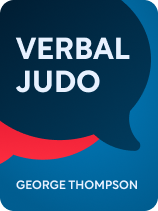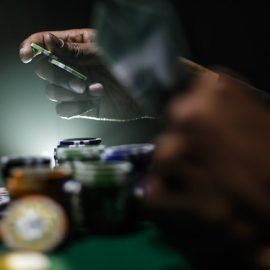

This article is an excerpt from the Shortform book guide to "Verbal Judo" by George Thompson. Shortform has the world's best summaries and analyses of books you should be reading.
Like this article? Sign up for a free trial here.
How is Verbal Judo applied to law enforcement? What happens when police officers practice empathy?
Law enforcement trainer and English professor George Thompson wrote Verbal Judo to explain how to handle any tense situation calmly. He argues that, in a high-pressure situation, it’s most effective to act as if you’re practicing judo.
Keep reading to learn about Verbal Judo for law enforcement.
Verbal Judo for Law Enforcement
Thompson (1941-2011) was a law enforcement trainer and founder of the Verbal Judo Institute. Before that, he earned a Ph.D. in English at the University of Connecticut and studied Rhetoric and Persuasion at Princeton University. After 10 years of teaching, he left academia and became a police officer. He learned how veteran law enforcement officers handled crises and used this knowledge to develop Verbal Judo, a de-escalation technique and “tactical communication” method. Thompson wrote his first book about Verbal Judo in 1983. He went on to train more than a million police officers to handle dangerous situations by communicating clearly and talking people down from violent behavior.
While Thompson developed Verbal Judo for law enforcement officers, he writes that the method proves useful whenever you need to communicate clearly and persuasively in a stressful situation.
If you’re like most people, you don’t always know how to behave when you’re under pressure. And Thompson explains that we naturally handle conflict reactively rather than responsively. When you react to a situation, you act in the heat of the moment. You might get defensive, take things personally, or attack the other person like you feel they’re attacking you. But, when you instead respond to a situation, you give yourself the perspective to act in a more intentional and measured way—one that’s much more effective at convincing the other person that you can come to a satisfactory solution together. Thompson contends that, by learning to respond using Verbal Judo, you can avoid harming other people, even when the situation gets tense.
(Shortform note: Responding instead of reacting sounds great, but it often doesn’t come naturally. That’s why law enforcement officers take “stress inoculation training,” which simulates stressful situations so officers can see how they naturally react and learn to respond instead, according to The Entrepreneur’s Solution author Mel Abraham. The name “stress inoculation training” is shared with a form of therapy that helps people with PTSD or anxiety prepare for stressful situations. Therapy exposes them to feelings of fear so they can respond more effectively when they feel afraid in everyday life. In much the same way, Abraham advises role-playing stressful situations to see how you naturally react. Then, you can learn to respond more productively.)
| Verbal Judo Aims to Get Officers to Use Words, Not Force. Does It Work? Thompson developed Verbal Judo for law enforcement officers, and his book was published in 1993, at a fraught moment for police agencies. In 1991, a Black man named Rodney King was severely beaten by Los Angeles police officers after he fled a traffic stop. King was struck 56 times with police batons, and a bystander captured a video that was broadcast nationwide. When the four officers involved (three of them white) were acquitted, five days of riots erupted as Los Angeles residents demonstrated their outrage. At the time, Thompson said he thought Verbal Judo could have prevented the incident entirely. (The officers involved had been scheduled to take a class with him the following week.) King’s beating sparked a national debate and made white Americans more aware of the violence faced by people of color. It also prompted conversations about how to move to a community policing model and train officers in de-escalation techniques. In the 2010s, after a series of officer-involved incidents resulting in the deaths of Black Americans thrust the issues of racial injustice and police brutality back into the spotlight, interest in de-escalation resurged. In 2014, the NYPD announced that it would train its officers in a version of Verbal Judo. But critics question whether de-escalation works in law enforcement, where it’s often at odds with officers’ training to react as quickly as possible and use force when needed. (Officers also learn to prioritize protecting themselves: The police don’t have a constitutional duty to protect others from harm. And Thompson noted in a 1995 interview that the main goal of his version of “community policing” is to keep officers safe.) Experts say that efforts to reduce aggressive policing should be guided by research. So far, preliminary studies suggest that de-escalation training seems to reduce both the number of police killings and the number of police officers killed—however, experts say that it needs to be combined with other measures to be truly effective. However, a study that looked specifically at the effects of Verbal Judo training found mixed results regarding whether learning the method changes how officers communicate with the public. Additionally, researchers say that changes might not be sustainable if police departments don’t also alter their policies and accountability practices on the use of force. Activists call for thinking about the role that police officers should serve in their community and considering whether social workers, paramedics, or mental health specialists might be better equipped to handle some of the calls that police currently field. |
Empathy in Police Communications
The most basic tool for practicing Verbal Judo is empathy: the ability to understand someone else’s perspective, even if you disagree with them or their interpretation of the situation. Thompson explains that empathizing with the other person, no matter how unreasonable you might think they’re being, enables you to take the tension out of the situation. That’s because practicing empathy helps you give people what they want: to be understood. Demonstrating that you’re trying to understand what the other person needs and listening to what they’re saying can go a long way toward getting them to dial back their language, even when they’re still feeling angry or upset.
| How Does Empathy Affect How Police Officers Communicate? Thompson may have been ahead of his time in giving empathy such a prominent place in Verbal Judo. Experts say it wasn’t until after the 1992 discovery of mirror neurons—which activate when we take an action and when we watch someone else taking that action—that people began to recognize that empathy is more than an emotion and plays a critical role in helping us understand each other. Research is even beginning to show that it’s useful specifically in police interactions, too: When police departments encourage more empathetic ways of communicating, it helps officers slow down, use force less often, and build trust with the communities they serve. That said, some experts argue that relying on empathy in our interactions with others has drawbacks. Against Empathy author Paul Bloom contends that because we empathize more with people who are similar to us, empathy can make us more likely to discriminate against those who are different from us. Implicit biases affect our thinking and behavior even when we believe in equality and intend to be fair, which is why police officers often undergo implicit bias training. But research shows that these programs don’t seem to reduce racial biases in policing, which illustrates how persistent these biases are and how hard it is to stop them. |

———End of Preview———
Like what you just read? Read the rest of the world's best book summary and analysis of George Thompson's "Verbal Judo" at Shortform.
Here's what you'll find in our full Verbal Judo summary:
- How to handle any tense situation calmly
- How you can persuade even the angriest person to cooperate
- The three most important verbal judo principles






